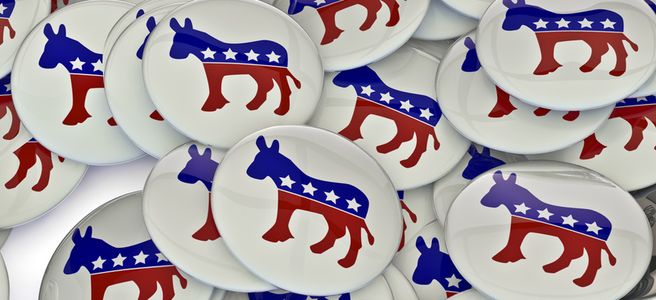Poll: Clarke Tucker has big lead over three opponents in Second Congressional District Democratic primary
by May 6, 2018 10:00 am 2,128 views

State Rep. Clarke Tucker (D-Little Rock) has a sizable lead over his three Democratic primary rivals – Gwen Combs, Jonathan Dunkley and Paul Spencer – as early voting begins and Election Day is just two weeks away. Notably, nearly one-third of likely Democratic primary voters in the Second Congressional District are undecided on their candidate.
A new Talk Business & Politics-Hendrix College survey of 624 likely Democratic primary voters was conducted last week. It has a margin of error of 3.9%. Respondents were polled by live callers via cell phones and through automated calls. They were asked:
Q: If the Democratic primary election for Congress in the Second District was being held today, and the candidates were Gwen Combs, Jonathan Dunkley, Paul J. Spencer, and Representative Clarke Tucker, for whom would you vote?
11% Gwen Combs
6% Jonathan Dunkley
10% Paul J. Spencer
41% Representative Clarke Tucker
32% Don’t Know
“The big takeaway from this poll is that Clarke Tucker is the firm frontrunner over his three challengers in the race for the Democratic nomination,” said Roby Brock, Talk Business & Politics Editor-in-Chief. “While he tops 40% in support, he does fall short of a majority and a third of the Democratic primary electorate remains undecided. The question becomes: Where do these undecided voters go?
“Do they divvy up among the four candidates? Can Tucker and his paid media avoid a run-off by garnering a portion of those remaining undecided voters? Will one or more of his three opponents find a way to promote a competitive message at the finish line and force a run-off? I think we’re in for a thrilling final two weeks,” Brock said.
A challenge in developing the model for this primary poll and its demographics was the fact that there haven’t been strong statewide or district-wide Democratic races in the Second District since 2010, eight years ago. In 2016, the Hillary Clinton vs. Bernie Sanders Presidential primary turned out voters, but Clinton’s Arkansas roots among Democrats made this a less competitive race than other states, and 2018 is not a Presidential election year complicating turnout predictors.
Additionally in 2014, Democratic Congressional candidate Pat Hays, the former mayor of North Little Rock, was unopposed in the primary. In 2012, incumbent President Barack Obama faced token opposition from an unknown Tennessee candidate. In both 2012 and 2014, there were heavier turnouts in Republican primaries as the state GOP was making gains at the local level.
“In many ways, this 2018 primary vote is going to be the blueprint for seeing how Democratic voters have shifted in their activity and how they may vote in future election cycles,” Brock said. “How heavily will Pulaski County outweigh the other counties in the district? What will the gender gap be? Will younger voters make a political statement? Will the multitude of primary races in African-American districts influence turnout? All of these questions are unique to this election year and make past performance unreliable.”
The winner of the four-way Democratic primary for the Second Congressional District will face incumbent GOP Rep. French Hill and Libertarian Joe Swafford in the November general election.
Additional polling results from this latest Talk Business & Politics-Hendrix College survey of likely Second Congressional District Democratic voters will be released in the coming days. On Monday, results of the match-up for the Democratic nomination for Governor between Jared Henderson and Leticia Sanders will be revealed. On Tuesday, we’ll unveil Democratic sentiment towards President Donald Trump’s job performance. On Wednesday and Thursday, results will be released on Democratic attitudes on gun regulations and Arkansas Works.
METHODOLOGY
This survey of 624 likely Democratic primary voters was conducted on Tuesday-Thursday, May 1-3, 2018. The poll, which has a margin of error of +/-3.9%, was completed using live callers via cell phone and IVR survey technology. Respondents were chosen from a random sample of Arkansas Democratic primary voters who voted in at least one of the last three primary elections and whom indicated their likelihood to vote this year. Age was weighted.
Age (weighted according to 2016 state Democratic primary vote)
10% Under the age of 30
19% Between the ages of 30 and 44
37% Between the ages of 45 and 64
34% 65 or older
Ethnicity
1% Asian-American
23% African-American
1% Latino
69% Caucasian or White
6% Other
Gender
38% Male
62% Female
Education
2.5% Did not complete high school
13% High School Graduate
25% Some College
32% Graduated College
27.5% Post-Grad Degree
Pulaski County vs. Non-Pulaski County
66% Pulaski County
34% Non-Pulaski County
Live Caller vs. IVR
24% Live Caller/cell phones
76% IVR
All media outlets are welcome to reprint, reproduce, or rebroadcast information from this poll with proper attribution to Talk Business & Politics and Hendrix College. For interviews, contact Talk Business & Politics Roby Brock by email at [email protected].
